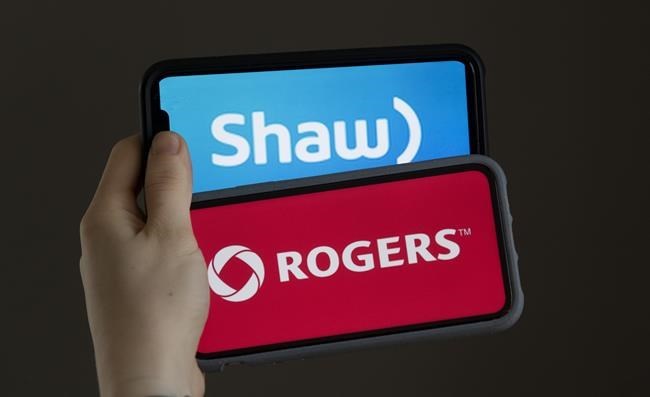OTTAWA — Rogers Communications Inc. and Shaw Communications Inc. said Friday that they're happy with the Competition Tribunal's speedy dismissal of an effort by the Competition Bureau to block their $26-billion merger, while also extending the closing date by a month.
The Competition Tribunal issued a summary of its decision late Thursday that found the merger was not likely to result in higher prices for wireless customers in Western Canada, and that it was satisfied the plan to sell Shaw's Freedom Mobile to Quebecor Inc.'s Videotron was adequate to ensure competition isn't substantially reduced.
The decision clears a path for the deal to go ahead, requiring only approval from federal Industry Minster François-Philippe Champagne.
“We are pleased with the favourable decision," said Rogers and Shaw in a joint statement. "We look forward to reviewing the details of the decision and working with the Minister of Innovation, Science and Industry so we can clear the final regulatory hurdle to close these transactions.”
Minister Champagne's spokesperson Laurie Bouchard said they will review the decision in detail and will have more to say in due course, while opposition leader Pierre Poilievre said at a news conference that he has serious concerns about more consolidation in the telecoms sector.
Rogers and Shaw thanked the Tribunal for its swift decision, as they had set a closing date for the deal of Dec. 31 and face additional payments to bondholders if it went beyond that, but they said Friday they had extended the close to Jan. 31, 2023.
The decision was largely expected by the market, said RBC analyst Drew McReynolds, but that the outright dismissal in a relatively timely fashion was a boost to the companies involved.
The head of the Competition Bureau, which had argued that the merger of the two telecommunications companies would lessen competition in the telecom market, trigger higher prices and lead to a worsening of service, expressed dismay at the Tribunal's decision.
"I am very disappointed that the Tribunal is dismissing our application to block the merger between Rogers and Shaw. We are carefully considering our next steps,” said Commissioner of Competition Matthew Boswell in a statement.
Next steps could include an appeal of the Tribunal's decision to the Federal Court of Appeal, which the bureau has 30 days to decide on.
What the grounds for appeal could be is difficult to say without the full text of the decision, said, Jennifer Quaid, an associate professor and vice-dean of research at University of Ottawa’s Faculty of Law.
Any potential precedents will also have to wait to be seen in the full decision, which the Tribunal said it would aim to release by late Saturday, but for now it looks like a fairly standard decision, said Quaid.
"It’s basically, unfortunately, par for the course merger law here ... it's fair to say that most of us who know merger law were perhaps disappointed but not surprised.”
The Tribunal has never fully blocked a merger, as the Competition Bureau was seeking, while only in a couple of cases has it forced companies to sell some assets to approval a deal, she said.
The decision comes after weeks of hearings that wrapped Dec. 15 where the Competition Bureau pushed its case that the deal would significantly increase Rogers' national market share and power and that the sale of Freedom to Videotron was not enough to address the anti-competitive effects of the merger.
In its summary, the Tribunal said Videotron's entry into Western Canada would be able to offer prices at least as competitive as what was offered before the merger, while overall the deal is also likely to spur increased competition among the three major telecoms companies in the region.
"The merger and divestiture are not likely to result in materially higher prices, relative to those that would likely prevail in the absence of the arrangement," the Tribunal said.
Quaid said the speed of the decision is quite a bit faster than in the past, where the Tribunal has taken months to issue a ruling, but that the hearing was conducted under an expedited process.
She said the unsurprising decision points to potential problems in Canada's competition laws, and the importance of the ongoing review of the merger review system. The review should tackle a range of issues, including potentially broader ones like the distribution of a merger's benefits, which currently don't much factor in.
"The time is ripe for taking a harder look at some things that traditionally were not in the radar," said Quaid.
Keldon Bester, co-founder of the Canadian Anti-Monopoly Project, said in a statement that the decision is a product of Canada’s permissive and outdated merger laws, but that the federal government could still make a difference by setting out more aggressive pricing targets as part of its conditions for approval, as well as timelines to meet them and consequences for not doing so.
This report by The Canadian Press was first published Dec. 30, 2022.
Companies in this story: (TSX:BCE, TSX:RCI.B, TSX:T, TSX:SJR.B)
The Canadian Press



